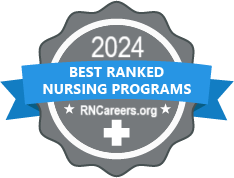Diabetes Nurse Educator Overview
- What You Will Do: A certified diabetes nurse educator specializes in providing guidance and management for patients with Type I and Type II diabetes, as well as gestational diabetes.
- Where Will You Work: Certified diabetes nurse educators work in the hospital setting, with private physician practices, or in public health and community clinics.
- Employment Projections: Nursing is expected to be one of the fastest-growing professions, with growth projected at 16% – 23%. Similarly, the need for certified diabetes nurse educators continues to increase, given the aging population and related diabetes.
- How Much Will I Earn: The average annual salary for professional nurses is $68,450; factors such as level of degree, specialty certification, geographical location and level of experience will affect salary. The average annual salary for certified diabetes nurse educators ranges from $70,190 – 86,189.
- Requirements to Become One: Become a registered nurse; complete an accredited nursing program, preferably earning bachelor’s degree in nursing (BSN), then obtain licensure as a professional registered nurse by passing the NCLEX-RN examination.

Five Steps to Become a Certified Diabetes Nurse Educator
- Earn Your RN: You must earn an RN degree from an accredited nursing program. While certification does not require a bachelor’s degree (BSN), employers typically do require a BSN degree for the position of diabetes nurse educator.
- Pass the NCLEX-RN Exam: After completed an accredited program, you must pass the NCLEX-RN exam to obtain licensure to practice nursing.
- Gain nursing experience: In your role as a professional nurse, seek a position that provides opportunities to work with patients with diabetes.
- Seek related continuing education: Continuing education related to diabetes education is necessary as a part of the requirements for specialty certification.
- Obtain Certification: The National Certification Board for Diabetes Educators (NCBDE) offers the Certified Diabetes Educator (CDE) credential.
What is a Certified Diabetes Nurse Educator?
A certified diabetes nurse educator specializes in providing care and guidance for patients with Type I, Type II and gestational diabetes, working with individuals or with groups. Certified diabetes nurse educators teach about the causes, pathophysiology and signs and symptoms of diabetes. They teach patients about self-assessment related to complications of diabetes, and the importance of following the treatment regime. They also teach patients about diet and nutrition related to maintaining appropriate blood glucose levels, as well as how to monitor those levels. They teach patients about oral and injectable diabetes medications, including correct administration, time of peak effects, signs and symptoms of hypoglycemia and how to avoid a drop in blood sugar. Insulin dependent diabetics must learn about the differing types of insulin, including the time of onset and peak effects. They participate in monitoring and tracking lab test result, such as periodic hemoglobin A1C checks. In addition, they teach patients about what the test is and the information it supplies. If the patient is having difficulty managing the disease, the nurse educator can enlist a family member or friend to assist the patient. They can report concerns, problems with the treatment regime, or barrier to compliance to the physician, then implement and evaluation of changes to the treatment plan.
How Do I Become a Certified Diabetes Nurse Educator?
The first step toward becoming a certified diabetes nurse educator is to become a Registered Nurse (RN), earning a Bachelor of Science (BSN) degree from an accredited nursing program. After graduation, you must obtain RN licensure by taking the NCLEX-RN examination in your state. Practice NCLEX-RN test questions.
The next step is to seek employment as a professional nurse providing direct patient care, optimally in a setting that provides opportunities to provide care and guidance for patients with Type I, type II or gestational diabetes. After 2 years experience that includes providing diabetes education, the next step is to apply for certification as a diabetes nurse educator.
The National Certification Board for Diabetes Educators (NCBDE) offers the Certified Diabetes Educator (CDE credential. Eligibility requires:
- Current, active, unrestricted professional licensure
- A minimum of two years professional practice
- A minimum of 1000 hours of diabetes education experience within 4 years of application for certification, with 400 hours within the year of application
- A minimum of 15 hours of related continuing education within the 2 years before application. The continuing education must be provided by a NCBDE approved provider
Certification is valid for 5 years.
The American Association of Diabetes Educators offers the Board Certificated-Advanced Diabetes Management credential for nurses with an advanced degree. Eligibility requires:
- Current, active, unrestricted RN licensure
- Master’s Degree in Nursing (MSN) or higher
- 500 clinical practice hours within 4 years of application for certification
Certification is valid for a period of 5 years.
Where Do Certified Diabetes Nurse Educators Typically Work?
Certified diabetes nurse educators find employment in a wide variety of settings, including hospitals, physician practices, public health, home health, and wellness programs. Typically they work in association with an accredited diabetes education program, one which has met the requirements of the Centers for Medicare & Medicaid Services, allowing for billing for diabetes self-management education for individuals or for groups.
How Much Do Certified Diabetes Nurse Educators Earn?
Nursing, in general, is identified as one of the fastest growing professions in the US in terms of salary, with a projected growth of 16% or higher, much higher than the national average. The median annual salary for nurses is 68,450, but the range of potential salary can vary, depending on degrees and certifications held, type of employment, and geographical location. According to the Bureau of Labor Statistics the top five states for general nursing salaries are (range 88,770 – 102,700);
- California
- Hawaii
- District of Columbia
- Massachusetts
- Oregon
Specialty certification can increase earnings significantly. Salaries are generally higher in urban areas, however, the cost of living is typically higher, as well. In addition, bachelor’s prepared nurses tend to earn higher salaries than nurses with associate degree in nursing. The average annual salary for nurse managers ranges from $70,190 – 86,189.
Certified Diabetes Nurse Educator Education
Additional specialty education for nurse managers at the undergraduate degree level largely consists of continuing education activities, such as professional conferences, in-service presentations or through professional organizations. The NCBDE provides a list of recognized approved providers, which includes, in part;
- American Association of Diabetes Educators – https://www.diabeteseducator.org/
- American Diabetes Association – https://professional.diabetes.org/
- American Nurses Association – https://www.nursingworld.org/
- American Association of Nurse Practitioners – https://www.aanp.org/
- National Association of Clinical Nurse Specialists – https://nacns.org/
An added option is seeking an advanced practice role as a nurse practitioner. This involves earning an advanced degree, either at the master’s degree or doctoral degree level. Universities offering a graduate degree in nursing with a concentration in diabetes/endocrinology include;
- Duke University School of Nursing, Durham NC – https://nursing.duke.edu/academic-programs/msn-master-science-nursing/endocrinology-specialty
- Columbia University Teachers College, New York NY – https://www.tc.columbia.edu/catalog/academics/departments/health-and-behavior-studies/diabetes-education-and-management/
- Duquesne University School of Nursing, Pittsburgh PA – https://onlinenursing.duq.edu/blog/msn-career-spotlight-diabetes-management-nurse/
- Yale University School of Nursing, New Haven CT – https://nursing.yale.edu/academics/master-science-nursing/masters-program-concentrations/diabetes-care-concentration

Find Nursing Schools
Join a Top-Ranked Nursing School for a Life-Changing Career!
What is a Typical Certified Diabetes Nurse Educator Curriculum?
At the undergraduate degree level, the overall focus for continuing education concerns;
- Basic knowledge
- Learning styles
- Cognitive/Change theory
- Motivational interviewing
- Type I Diabetes Mellitus
- Pharmacological therapy
- Lifestyle modification
- Type II Diabetes Mellitus
- Pharmacological therapy
- Lifestyle modification
- Obesity management
- Diabetes and pregnancy
- Diabetes prevention
Curriculum content for graduate programs with a concentration in diabetes/endocrinology is focused on topics such as;
- Behavior change strategies for diabetes prevention and management
- Pathophysiology of diabetes and related complications
- Assessment of individuals with diabetes
- Preventive and therapeutic interventions for diabetes management
- Pharmacology related to diabetes
- Clinical practice in diabetes care and management
The Role of the Certified Diabetes Nurse Educator in the Healthcare Provider Shortage
The Bureau of Labor Statistics cites that employment for nurses will increase at a rate of 16% by 2024. There is a national shortage of nurses in general related to the Baby Boomer population entering retirement, and the increased health needs of the growing aging population. It is projected that the South and West will be hardest hit by the nursing shortage. The 12 states expected to have the most acute shortages are; Florida, Georgia, Texas, Virginia, Alaska, Arizona, California, Hawaii, Idaho, Montana, Nevada and New Mexico.
Just as there is an increasing demand for nurses, in general, the need and demand for certified diabetes nurse educators is projected to increase 12% by 2024. As diabetes is a leading cause of death and disability, it is expected that the need for certified diabetes nurse educators will increase, due, in part, to the aging population and increased incidence of age-related diabetes. An added factor is the nationwide physician shortage; as a result, certified diabetes nurse educators are needed to help primary care providers manage patients with diabetes and ensure optimal patient care outcomes.
Certified Diabetes Nurse Educator Resources
- American Association of Diabetes Educators – https://www.diabeteseducator.org/home
- National Certification Board for Diabetes Educators – https://www.ncbde.org/
- American Diabetes Association – https://professional.diabetes.org/
- American Nurses Association – https://www.nursingworld.org/
References
- American Association of Diabetes Educators – https://www.diabeteseducator.org/home
- National Certification Board for Diabetes Educators – https://www.ncbde.org/
- Payscale.com – https://www.payscale.com/
- Study.com – https://study.com/
- US Department of Labor; Bureau of Labor Statistics – https://www.bls.gov/
- About the Author
- Latest Posts
Krystina is an RN with a varied background. She has worked on a telemetry unit, an allergy/immunotherapy clinic and is currently working in diabetes education, pursuing her Certified Diabetes Educator (CDE) certification. She has traveled the long road to her bachelor’s degree – she began her nursing career as an LPN, graduating from a local university. She pursued first her ADN, then BSN from Excelsior College.








